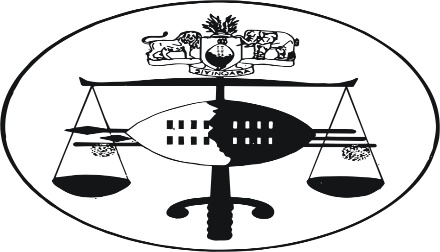IN THE INDUSTRIAL COURT OF ESWATINI
JUDGMENT
Case No. 110/2018
In the matter between:
PAULOS NGUBENI Applicant
And
ROYAL SWAZILAND SUGAR CORPORATION Respondent
Neutral citation: Paulos Ngubeni v Royal Swaziland Sugar Corporation [2018] SZIC 82 (09 August 2018)
Coram: S. NSIBANDE J.P.
(Sitting with N.R. Manana and M.P. Dlamini
Nominated Members of the Court)
Date Heard: 26/07/2018
Date Delivered: 09/08/2018
JUDGMENT
[1] The Applicant applied to the Industrial Court for the determination of an unresolved dispute arising from the termination of his services on 5th October 2017. He alleges that the termination of his services was both substantively and procedurally unfair in that there was no evidence presented to prove his guilt with regard to the charges he faced and that a person implicated in the wrong doing Applicant was accused of was allowed to be the initiator at the disciplinary hearing. He is claiming reinstatement, failing which payment of terminal benefits and 12 months wages as compensation for unfair dismissal.
[2] The Respondent filed a Reply in opposition thereto and denied dismissing the Applicant unfairly and averred that the Applicant was dismissed on grounds of dishonesty, theft and/or fraud following a duly convened disciplinary hearing.
[3] The Applicant has now applied to the President for the unresolved dispute between him and the Respondent to be referred to the Conciliation, Mediation and Arbitration Commission (CMAC) for arbitration. The application is opposed by the Respondent which objects to the dispute being determined by arbitration.
[4] The reasons advanced by the Applicant for the referral to arbitration are that:
4.1 the amount claimed by the Applicant is not substantial for the Respondent.
4.2 the issues for determination are not so complex as to require the formal and legalistic processes of the Court.
4.3 due to the backlog of cases in the Industrial court, the Applicant can obtain a more expeditious hearing if the matter is referred to arbitration.
4.4 Respondent stood to suffer no prejudice if the matter was referred to arbitration since the Industrial Relations Act 2000 confers a right to appeal (on question of law only) which would cure any shortcomings in procedure or findings of fact.
[5] The Respondent opposed the application and argued to the contrary that:
5.1 the issues involved in the matter are not straight forward and involve various disputes of fact.
5.2 the Applicant’s claim is substantial even for a business such as that of Respondent.
5.3 it is unfair for Applicant to file the application for the determination of an unresolved dispute before this Court and then seek to have the matter referred back to CMAC because it was costly for the Respondent.
[6] In argument, the Applicant’s representative submitted that the skill level of arbitrators at CMAC was no longer in question; that the amount sought was not substantial regard being had to the multi-million Emalangeni business of the Respondent; and that Applicant who had worked for Respondent for at least 32 years was now unemployed and suffering from not working and would also be punished by waiting 5 years or so for his matter to be heard in court whereas the legislative has created a more speedy process through arbitration. It was emphasised that the Applicant’s main prayer in his application for the resolution of his unresolved dispute was for reinstatement and not compensation and that compensation would be accepted only in the event that the court/arbitration found that reinstatement was unsuitable.
[7] Respondent insisted that the questions raised in Applicant’s claim were complex involving fraud, dishonesty and theft, that the Respondent had the right to appear at a platform in which it had full confidence and not be forced to appear before a forum where it had no choice of who became arbitrator.
[8] I have considered the submissions of the parties together with their heads of argument and the pleadings in the main application and the application for referral. I have taken into account the full circumstance of this case. It appears to me that there are a number of disputes of fact that arise in the main application, arising from the accusations and counter accusations the parties have made against each other. In my view, it would be prejudicial to the Respondent to shut the doors of the Court to it, in a situation where it will not be able to challenge an adverse finding of fact against it. While the arbitrators at CMAC now have legal training and experience, Judge President P.R. Dunseith’s statement in Zodwa Gamedze v Swaziland Hospice at Home IC Case No. 252/2005 stands true herein: “The potential prejudice of a referral to arbitration arises from one of the parties being deprived, against its will from access to a court of law for determination of the dispute.”
[9] It is also my view that the amount claimed by the Applicant is substantial even for an undertaking such as that of the Respondent. I am alive to the submission that the Applicant seeks reinstatement. Again the Court or arbitrator would have to make factual findings with regard to whether or not the circumstances surroundings the Applicant’s dismissal are such that a continued employment relationship would be intolerable and whether it is not reasonably practicable for the employer to reinstate Applicant. An adverse finding of fact on these issues is not appealable thus potentially prejudicial to the Respondent.
[10] Having had regard to the particular circumstances of this case and for the reasons set out above I make the following order:-
(a) The application for the referral of the unresolved dispute between the parties to CMAC for arbitration is refused.
(b) There is no order as to costs.

For Applicant: Mr. M.S. Dlamini
For Respondent: Mr. H. Magagula
6
